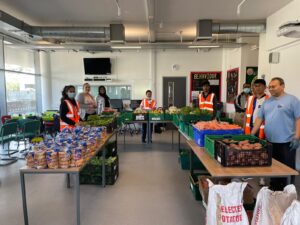
Across the UK, the cost of living has been increasing since early 2021, with the annual rate of inflation being the highest it has been since 1982 in June 2022, affecting the affordability of goods and services for households.
The military, political and humanitarian impact of Russia’s invasion of Ukraine, and in part a return of global gas demand as pandemic restrictions, serve as a few of the implications for the world economy.
The UK government says it has a number of plans to tackle the cost-of-living crisis ready for the next prime minister to choose despite (as of Thursday 11 August) crunch meetings between energy firms and ministers failing to produce any fresh action for tackling the inflation of soaring energy bills, which are predicted to hit over £4,200 a year.
The government’s annual Family Resources Survey, published late in March, found that Black, Bangladeshi and Pakistani households are disproportionately likely to face “low” or “very low” food security.
South Asians are widely known to have bigger families and live in larger households, thus the increase in fuel and energy will be significantly higher in this community.
Shanaz Ali community women’s project lead at BEAP talks about the knock-on effect of the drastic increases in livelihood, the living wage gap and struggles to run your household with the same disposable income, as people are disproportionately affected by low pay and spiralling living costs.
“There are no pay rises, no increase in benefits, oil prices have doubled, we are having to limit things really, not use excessive amounts of anything and not buy unnecessary things.
“People have openly been talking about their struggles, with them mostly dreading October, when energy bills will further increase, as people are worried about how they will manage to pay their bills”.
Laila Begum, a member of the Bradford community, has also noticed a change within the community, she says “Everybody is really struggling with the crisis, especially with the gas and electric bills, as well as petrol going up, the average family is really struggling”.

“These days it is all everyone is talking about, and I know larger households with bigger families are struggling with their bills”.
Laila adds “The oil prices have gone up a lot, which we use a lot in our cooking, frying and everything, so now that it’s gone up to nearly nine or ten pounds, for a five-litre bottle of pure vegetable oil, we are struggling”.
“The community has cut down on cooking and using less oil, and people are moving more toward air frying, even though with that, the electricity bill is going to go up, so whichever way you look at it we’re stuck in the middle,” says Miss Begum.
Having volunteered at a community centre over Covid, working with people on their mental health, Laila says “People are becoming mentally stressed; we are struggling ourselves and wondering how we are going to cope”.
As millions of people are at risk of fuel poverty with the annual cap on energy prices expected to go up to £2,800 this autumn, food banks have been warned of rising demand, including people who had not previously considered using one.
Further down South in Queensbury, on the northwest side of London, which is predominantly populated with South Asians, a food bank has seen a rise in beneficiaries from within the community.
Shivani Patel head volunteer at Go Dharmic tells Asian Sunday:
“The South Asian community, in general, is very hesitant to ask for help, and it is very much the mindset that ‘we will make everything work out’ but in certain situations, like the cost-of-living crisis, there’s only so much you can do to be self-sufficient and not ask for help.
The cost of living can be attributed to the rise in beneficiaries coming to the food bank, as Shivani says, “Since we have had the whole petrol situation and the electricity bills going up, it seems coincidental that we have suddenly had a lot more people coming in”.












